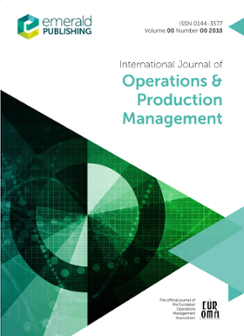Short of drugs? Call upon operations and supply chain management
IF 7.1
2区 管理学
Q1 MANAGEMENT
International Journal of Operations & Production Management
Pub Date : 2021-06-07
DOI:10.1108/IJOPM-03-2021-0175
引用次数: 7
Abstract
PurposeThis “impact pathways” paper argues that operations and supply chain management (OSCM) could help address the worsening drug shortage problem in high-income countries. This significant societal problem poses difficult challenges to stakeholders given the complex and dynamic nature of drug supply chains. OSCM scholars are well positioned to provide answers, introducing new research directions for OSCM in the process.Design/methodology/approachTo substantiate this, the authors carried out a review of stakeholder reports from six European countries and the academic literature.FindingsThere is little academic research and no fundamental agreement among stakeholders about causes of shortages. Stakeholders have suggested many government measures, but little evidence exists on their comparative cost-effectiveness.Originality/valueThe authors discuss three pathways of impactful research on drug shortages to which OSCM could contribute: (1) Developing an evidence-based system view of drug shortages; (2) Studying the comparative cost-effectiveness of key government interventions; (3) Bringing supply chain risk management into the government and economics perspectives and vice versa. Our study provides a baseline for future COVID-19-related research on this topic.缺药?调用操作和供应链管理
这篇“影响路径”论文认为,运营和供应链管理(OSCM)可以帮助解决高收入国家日益严重的药品短缺问题。鉴于药品供应链的复杂性和动态性,这一重大的社会问题给利益攸关方带来了困难的挑战。在这个过程中,OSCM学者们很好地提供了答案,并为OSCM引入了新的研究方向。设计/方法/方法为了证实这一点,作者对来自六个欧洲国家的利益相关者报告和学术文献进行了审查。关于短缺的原因,几乎没有学术研究,利益相关者之间也没有根本的共识。利益相关者提出了许多政府措施,但几乎没有证据表明它们的相对成本效益。作者讨论了OSCM可以为药物短缺研究做出贡献的三种途径:(1)建立基于证据的药物短缺系统观点;(2)研究重点政府干预措施的比较成本效益;(3)将供应链风险管理纳入政府和经济视角,反之亦然。我们的研究为未来有关该主题的covid -19相关研究提供了基线。
本文章由计算机程序翻译,如有差异,请以英文原文为准。
求助全文
约1分钟内获得全文
求助全文
来源期刊
CiteScore
13.30
自引率
17.20%
发文量
96
期刊介绍:
The mission of the International Journal of Operations & Production Management (IJOPM) is to publish cutting-edge, innovative research with the potential to significantly advance the field of Operations and Supply Chain Management, both in theory and practice. Drawing on experiences from manufacturing and service sectors, in both private and public contexts, the journal has earned widespread respect in this complex and increasingly vital area of business management.
Methodologically, IJOPM encompasses a broad spectrum of empirically-based inquiry using suitable research frameworks, as long as they offer generic insights of substantial value to operations and supply chain management. While the journal does not categorically exclude specific empirical methodologies, it does not accept purely mathematical modeling pieces. Regardless of the chosen mode of inquiry or methods employed, the key criteria are appropriateness of methodology, clarity in the study's execution, and rigor in the application of methods. It's important to note that any contribution should explicitly contribute to theory. The journal actively encourages the use of mixed methods where appropriate and valuable for generating research insights.

 求助内容:
求助内容: 应助结果提醒方式:
应助结果提醒方式:


